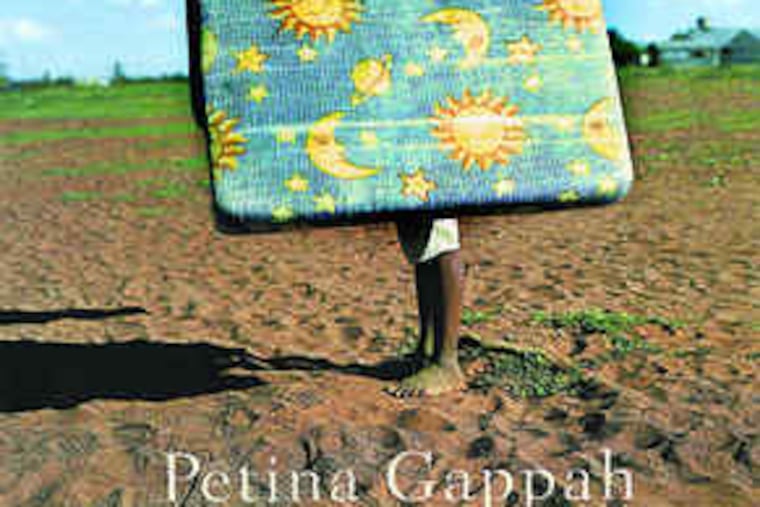Well-told stories that transcend their location
It's one of the most tiresome things Western readers do. Taste for the exotic overtakes taste. Good books, good stories can come only from faraway lands, preferably those whose injustices have been taken up in academic circles. Got a novel? Better be about Darfur. Or China. If it must be within our borders, make it the South. Or Appalachia. If you can't manage those, how about working-class despair in the Western deserts?

By Petina Gappah
Faber and Faber. 224 pp. $23
nolead ends nolead begins
Reviewed by John Timpane
It's one of the most tiresome things Western readers do.
Taste for the exotic overtakes taste. Good books, good stories can come only from faraway lands, preferably those whose injustices have been taken up in academic circles. Got a novel? Better be about Darfur. Or China. If it must be within our borders, make it the South. Or Appalachia. If you can't manage those, how about working-class despair in the Western deserts?
An Elegy for Easterly, by Zimbabwean writer Petina Gappah, could well fall prey to such hypocritical praise of fiction written by those very different from us. Do not let that happen. This collection of stories, written by an accomplished Zimbabwe-born woman who is now an international-trade lawyer in Geneva, is far better than that.
Let no one say, "This is a collection of stories revealing the downtrodden lives of ordinary Zimbabweans." OK, let them say that; it's their right, and as far as it goes, it's partly accurate. But it also misleads. These are stories about human beings and their pleasures, sufferings and fates. Their author's spare, humane, ironic prose reminds us at every turn of how we hope, how we hurt, how we injure one another, how no one is immune from frailty, from being wrong and being wronged, no one apart from self, species, planet.
That - not country of origin, not race, gender, or historical context - is what earns good fiction the adjective good. That's what makes Elegy for Easterly work. That's what has made it a huge success in Europe, landing only lately on these shores. It is welcome - and better than the reasons too many critics will give for liking it.
If you want an understated, virulent outcry against two-faced corruption, empty promises, hard-hearted apathy, tribalism, sexism, and godless, mindless, brainless incompetence, read the first tale here, "At the Sound of the Last Post." Gets it all done and tells a good story in the process. Or read the title story, of an endangered shantytown whose squatters grasp at chances for a life.
If you want humor, read "The Mupandawama Dancing Champion." If you want heartbreak, try "The Cracked, Pink Lips of Rosie's Bridegroom." If you want to see how even injured marriages can find a way to repair themselves, based on purely practical, earthbound terms, read "The Negotiated Settlement."
If you want a story about how people faced with terrible futures scuffle to reinvent themselves, read "Something Nice From London." If you want good stories about how people craft lives in the midst of impossible circumstances, such as million-percent inflation, political obduracy, a racial conflict, and a death-sentence virus ravaging entire generations, read "The Maid from Lalapanzi" or "Aunt Juliana's Indian."
And if you want a taste of the host of different languages floating through the Zimbabwean air, and the social and emotional values associated with them, Gappah laces her prose with words, phrases, and sentences, often untranslated. It tunes the ear and works as a running metaphor for the successes and frequent failures of coexistence.
At first take, Zimbabwe would seem a fertile crescent for excellent fiction, if only because so much is wrong there: economics, politics, gender relations, history, as well as race and identity issues. But a mere listing of causes won't make for good fiction. The writer needs to hear and see people to do that; she needs to be able to shape a story, creating expectations and either meeting or dashing them, and suggesting why that conclusion was met. More, she must take a point of view both of the people, time, and place she is writing about (a tortured land in transition, late 20th century), and apart from them (to write for people with no knowledge of Zimbabwe, so the events are accessible to them). On all counts, Gappah does very well, indeed.
In other words, she tells stories of people, for people. We learn much about Zimbabwe and Zimbabweans, and we'd be evil people if we did not shake our heads moralistically and wish things were better there. But we should not be like the proverbial Westerner who goes only for the exotic locale and ignores the people who live there. That would deny Elegy for Easterly its widest meaning and strongest point: its faith in a common human need for - and urge toward - compassion.